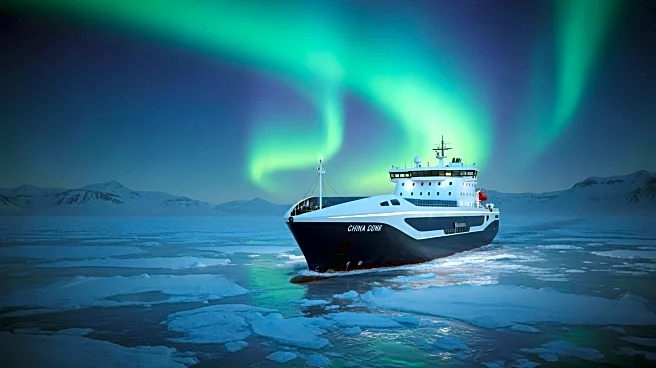What's Happening?
Chinese officials are celebrating the record-time arrival of the containership Istanbul Bridge at the Port of Felixstowe in the UK. The vessel, operated by Sea Legend, completed its Arctic transit in approximately 21 days, departing from Ningbo-Zhoushan port on September 22. This marks a significant milestone in diversifying shipping routes between China and Northern Europe, adding a fourth option alongside the China-Europe Railway Express, the Suez Canal, and the Cape of Good Hope. The ship, built in 2000 and registered in Liberia, carried at least 4,000 TEU of cargo valued at $197 million, including clothing and energy storage cabinets. The transit was completed without an icebreaker, taking advantage of the season's minimal ice conditions.
Why It's Important?
The successful Arctic transit underscores China's strategic efforts to diversify its shipping routes, potentially reducing dependency on traditional paths like the Suez Canal. This development could enhance trade efficiency between China and Europe, particularly for high-demand goods such as photovoltaics and electric vehicles. However, environmental concerns persist, as the melting ice opens up the Arctic for shipping, raising operational and ecological risks. Russia's commitment to year-round Arctic transits further complicates the environmental debate, with a goal of 200 million tons of cargo annually by 2030.
What's Next?
The Istanbul Bridge is set to continue its journey to Hamburg, Germany, bypassing Rotterdam due to strikes and delays. The expansion of Arctic shipping routes may prompt further investment and development in infrastructure to support increased traffic. Stakeholders, including environmental groups, are likely to intensify their scrutiny and advocacy against Arctic shipping due to its potential impact on the fragile ecosystem.
Beyond the Headlines
The geopolitical implications of Arctic shipping routes are significant, as they may alter global trade dynamics and influence international relations. China's support for Russia's Arctic ambitions could strengthen bilateral ties, while potentially challenging U.S. and European influence in the region. The environmental impact of increased Arctic shipping remains a critical concern, with long-term consequences for climate change and biodiversity.









